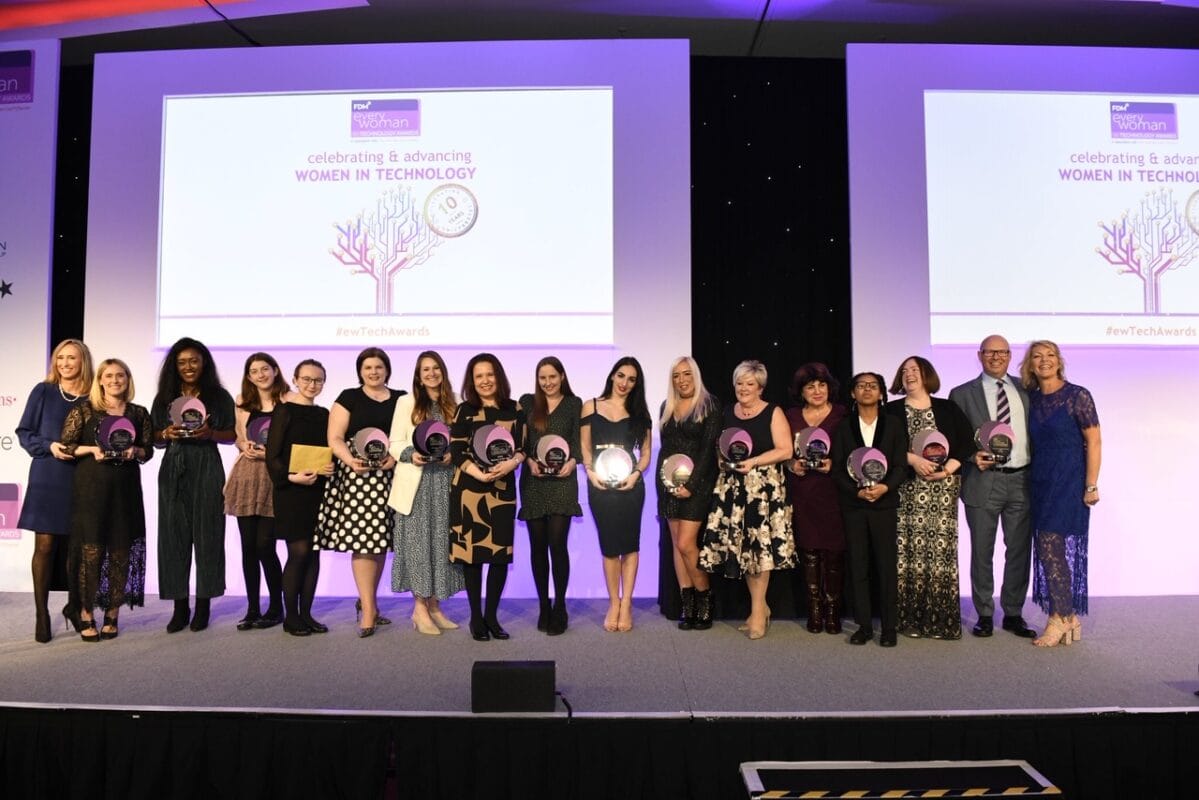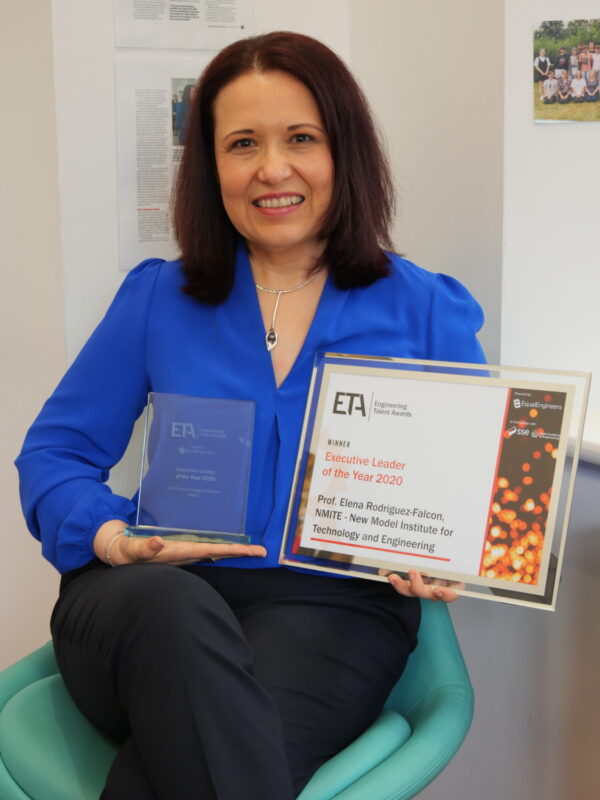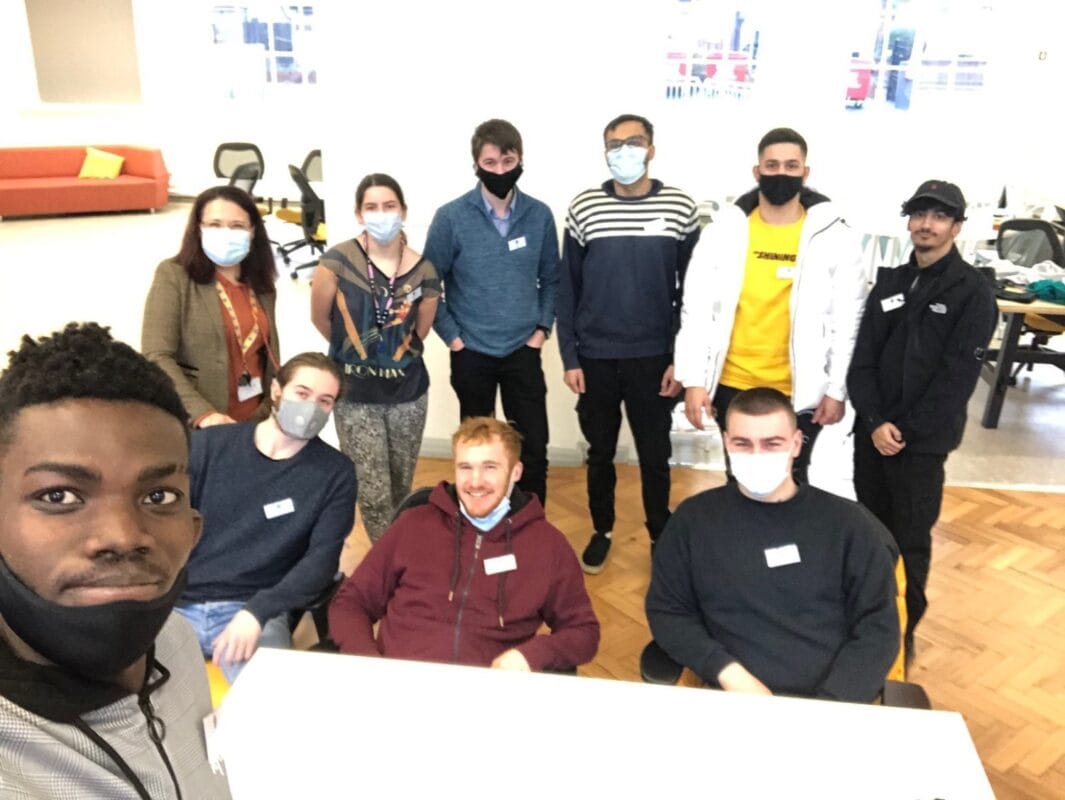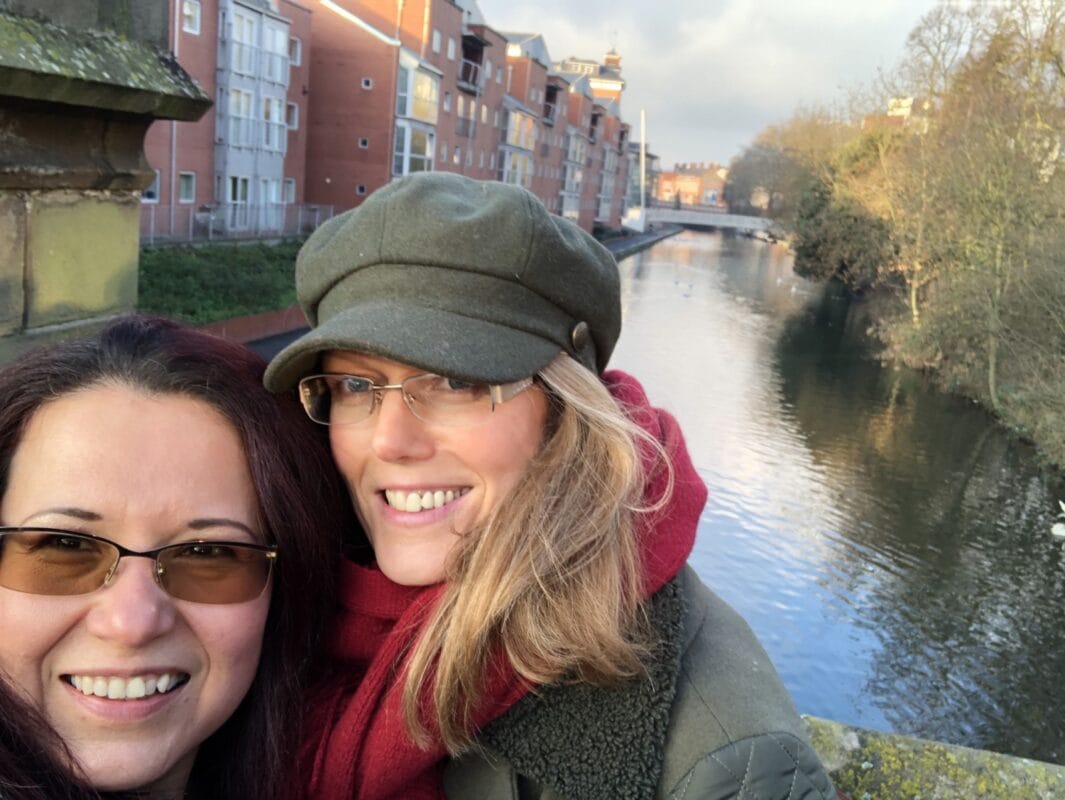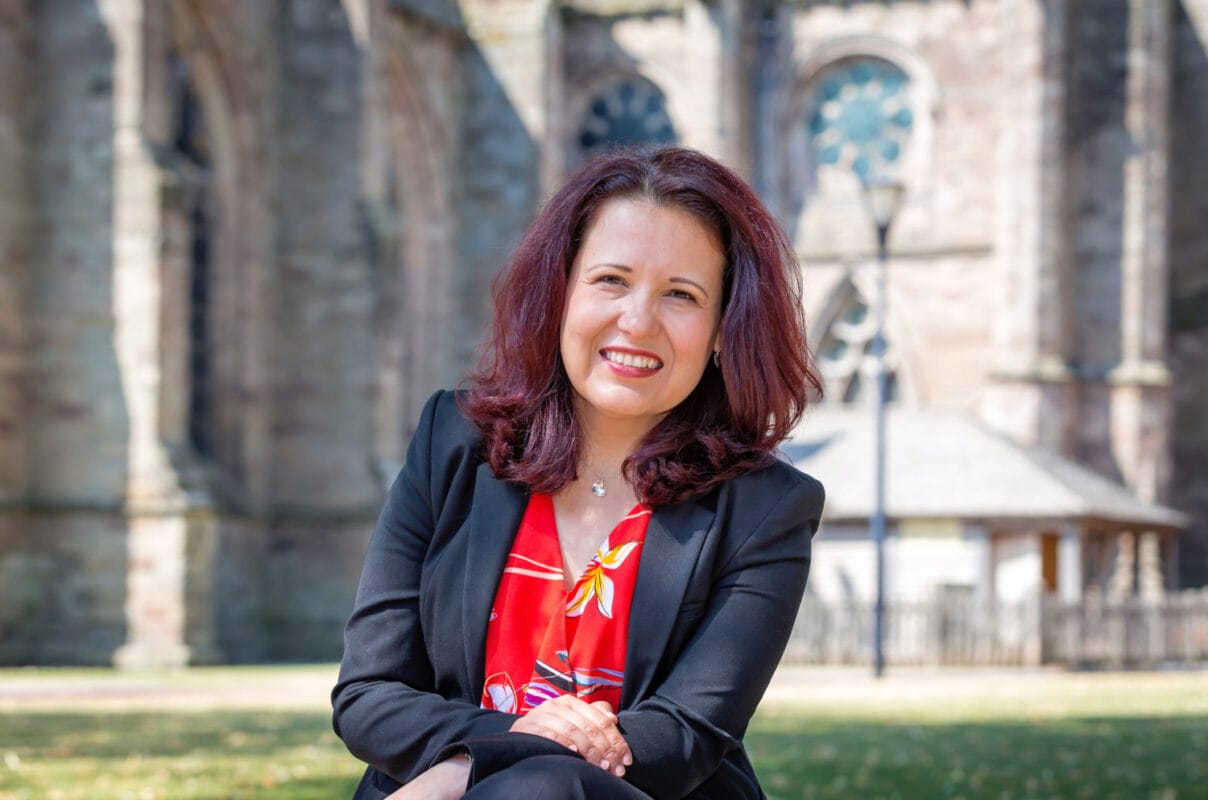Meet Elena Rodriguez-Falcon, President & Chief Executive Officer of the most ambitious and radical disruptor in engineering higher education in the UK: New Model Institute for Technology and Engineering (NMITE). She is a Multiple award winner on education, equality, and leadership.
Who is Elena Rodriguez-Falcon? Define yourself
Elena is a female Mexican Mechanical Engineer, born in Monterrey, Mexico. An only child to working class parents who didn’t have the educational opportunities that are available now. Elena describes them as decent, hardworking, incredibly good, and loving parents. She moved to the UK in 1998, which was a big change in her life and came out as a gay woman in 2006. An individual with a complex story with many twists and turns in her life, but someone who is determined to overcome obstacles. Although she has found it hard at times, Elena believes that resilience is like a muscle, you exercise it and you become better at it. Grit, passion, determination, honesty and being true to herself make her the woman she is today.
“Resilience is like a muscle, you exercise it and you become better at it”
How were you as a kid?
At an early age I was a quiet child. As an only child, who lived far away from any other relatives, I lived at first feeling a little lonely but was very focused on the things that my parents instilled in me. My parents would say ‘Elena Maria, you can achieve everything you dream of, so long as you work hard and treat people well. Never ever allow anyone to treat you badly’. With that philosophy I went on to become a very dedicated student. When around nine years of age I discovered that if I engaged people with a happy outlook that they responded well. This resulted in many friends being made and by the time I joined the secondary school I was a very studious pupil and very friendly child.
You are from Mexico, and you moved to the UK, did that fact shape your life?
As mentioned, I moved to the UK when I was 26, and so with nearly half of my life being in this country it has definitely shaped who I am. When I first arrived in the UK, I was still developing my own personality as a professional, but with all of my academic career being here, culturally, and professionally I have evolved, and I now have a combination of the two cultures. This I believe has resulted in a much more diverse personality which, I hope, inspires others around the world.
You hold an MEng Mechanical Engineering, UANL, Mexico; MBA in Industrial Management, Sheffield Hallam University, UK; PGT Diploma in Education, The University of Sheffield, UK. Doctorate in Engineering Honoris Causa, UANL, Mexico, why did you choose those courses of study?
Growing up I wasn’t really clear about what I wanted to do and so when it came to choosing a future career, my original thoughts on going into medicine were shattered when it came to light that I really don’t like blood. I therefore looked around and saw that locally there was a lot of industry, with the best paid roles being in engineering. I was good at math and physics and with the fact that I enjoyed fixing things I decided to study Mechanical Engineering. As simple as that.
But when I came to the UK, I came to do an MBA, which was partly informed from when I worked in industry in Mexico. I realised that I didn’t have the skills from the degree I had undertaken, to be an effective engineer, and so I decided that an MBA would help. Of course, being able to speak English was also a very desirable attribute and so the UK was the right place to relocate to. However, I went on to realise that the degree I undertook in Mexico wasn’t the problem, I would have experienced the same issues if I had studied for my Mechanical Engineering Degree in the UK. The way we educate engineers around the world, is in my opinion, not fit for purpose.
I then went on to work in higher education (HE) where I discovered my vocation, leading me on to do a diploma in education at the University of Sheffield, which with my other achievements resulted in a Doctor of Engineering, Honoris Causa being granted in Mexico.
“You can achieve whatever you set your mind to”
For the people who don´t know, what´s New Model Institute for Technology and Engineering (NMITE)? And what does it make unique in the market?
The New Model Institute for Technology & Engineering “NMITE” is a newly created Higher Education Institute (HEI) in the UK, which was conceived many years ago as a vehicle for change. Change in the way we educate with the aim to equip ‘work ready’ engineers to help fill the engineering gap that currently exists in this country. NMITE was also created to help regenerate Herefordshire, the County is it located in, which is, and has always been a cold spot for higher education. What makes it unique is that it is the first new Greenfield Higher Education Institution built in the last 40 years, with a very clear mandate for disrupting HE in engineering. The ‘new’ model is one that brings aspects of various disciplines such as medicine and architecture from models in the USA, Olin College of Engineering in Needham, Massachusetts, and Quest University Canada. It answers the challenges, both of the employers, who report back that those graduates are not work ready and therefore not engineers in the true sense.
The model is unique because it is linear, it has a new module each month that has at the core a project from an employer (or industry?) to serve as a vehicle for learning. Instead of four years, the standard length of an engineering degree in this Country, it is accelerated to three years. Our engineers in training learn from 9am-5pm, Monday to Friday, 46 weeks of the year. They learn in spaces that reflect the world of work, in teams of five, broken down from groups of 25. There are no lecture theatres or lectures with only small seminars. There are no exams, everything is assessed by project work and continual assessment with the employers remaining very closely involved, making NMITE unique.
You founded the University of Sheffield Enterprise (USE), later you moved away from Sheffield becoming President & CEO of NMITE. Now heading up the most ambitious and radical disruptor in engineering higher education in the UK. You are a Fellow of The Institute of Engineering Technology (FIET), Fellow of The Chartered Management Institute (FCMI), and Principal Fellow of the Higher Education Academy (PFHEA). Multiple award winner on education, equality, and leadership. What´s the recipe for your success?
Wow! A very good question. Firstly, I didn’t set out looking for success and recognition. I began my journey in my own classroom in Sheffield where I was determined to provide my students with an experience that reflected the world of work, to equip them with the skills to enter the working environment successfully and confidently, not feeling the way I did after graduation. And so, that passion to provide those experiences became liked, known, appreciated, and recognized by the students, who nominated me for the awards because they had something different and unique.
If there is a recipe then it is exactly what my parents said to me, ‘you can achieve whatever you set your mind to’. In my case, this was to try and challenge what we were doing in higher education, and I still do that to this day. Do it with passion, determination, and grit. Don’t let anyone tell you that it is not a good idea. Have a strong voice and believe that what you are doing is for the right reasons. As soon as you begin to make progress on your journey your voice begins to have value. You must use it with care, treating people with respect, ensuring you use your voice for good, as the snowball effect will now begin. I am a passionate believer in equality, diversity and inclusion and I use my voice for that. I am a female engineer, that as mentioned is an underrepresented characteristic in this field. I am an international individual in this country and am a gay individual, all of which give me the responsibility, or least I chose to a have the responsibility, to help those who might not yet have a voice.
“Don’t let anyone tell you that it is not a good idea. Have a strong voice and believe that what you are doing is for the right reasons”
NMITE has set its goals high – to become a model for Respect, Equality, Diversity, and Inclusion in the workplace as well as the classroom. Tell us more about it.
The new model does have high goals and certainly the original idea was to ensure that as we have had a unique opportunity to create this institute from scratch, that we remove barriers for students that might not have normally had the opportunity to study at a HE level by removing A-level requirements in math and other disciplines. Also, to embed in the model those attributes that we have spoken about [equality, diversity, and inclusion] that help us as an institute and also as a profession, to improve what we do. The same goes for our students. From day one when I welcome new students into NMITE we talk about respect, we talk about how we help diversify the profession, how we should treat each other equally and make sure we are all included in the organisation where intolerance is not accepted.
In your opinion, what are the biggest challenges faced by women in STEM? What would you suggest addressing this?
I’ve talked a lot about challenges faced by women in STEM, particularly in engineering, and I believe it is well understood that there are still many barriers across the world where perception around the profession’s role models and aspirational opportunities, even what we see on TV, discourages women from considering technical vocational professions. On the other hand, they inspire women to think about professions like medicine and law just by a mere advertisement or scheduled program.
More structurally, when a student in this country does their GCSE and A-levels they are choosing very early on and funneling their choices. We as women face the challenges that the funnel creates by reducing the number of women. Women will find themselves having to choose between having a family and starting a career.
What Athene Donald refers to as a leaky pipeline, where you start with a group of young women studying physics and math choosing medicine and other disciplines, so you begin the leaky pipeline, losing potential engineers, you then go on to do A-levels and lose some more. If you then go on to study engineering in, HE and graduate, get a job we then lose even more due to caring responsibilities, resulting in a tiny proportion actually working in those professions.
There are many structural challenges but also challenges that we impose on ourselves as to whether we can achieve and whether we have the strength to compete in a man’s world. I believe this is something we need to work on.
“Courage is something you can develop. I have always thought of myself as a courageous person, having taken so many risks over the years, but if you go back to the point where I mentioned my sexuality, it took me years to come out”
What are the “myths” that you would like to dispel about being a woman in STEM?
The main one is that we work with machines in a dirty environment, and that we cannot, as women, aspire to change the world through engineering. All things that are of course myths. There are branches of these disciplines that have a dirty element to them but mostly this is untrue. Engineers work in teams, solving problems, allowing the possibility of solving problems that you are passionate about i.e., environmental, infrastructure, medical, fashion, food, whatever it may be. There are so many cool and exciting opportunities to be had in engineering, many of which are lifechanging.
What are the biggest lessons you’ve learned over the years?
There are so many, but the first one is that courage is something you can develop. I have always thought of myself as a courageous person, having taken so many risks over the years, but if you go back to the point where I mentioned my sexuality, it took me years to come out. If you don’t think you are courageous it really doesn’t matter, it is something that can be developed, one step at a time.
Another lesson is that it is always better to be upfront, open, transparent, and honest. It is more painful to carry worries and secrets, things that will ultimately not leave you alone. Being true to yourself is always the best way forward.
If you have a dream that you are passionate about, you must always work hard to achieve it. It may not be an easy journey but if it is something you truly believe in then it will be a journey worth taking.
It is better to try, and get it wrong, then not to try at all. Making mistakes is the best tool to learn. Be brave, take risks, make mistakes, and learn from them. I have every confidence that this will make you happier.
“If you have a dream that you are passionate about, you must always work hard to achieve it. It may not be an easy journey but if it is something you truly believe in then it will be a journey worth taking”
Do you have any particular philosophy that guides your career decisions?
For sure, I think there are a few quotes, although not philosophies, that resonate. As mentioned, honesty, truthfulness, transparency are all vital attributes along with treating people with respect. Taking risks and learning from them is important to me. I would rather take the opportunity of a lifetime in the lifetime of the opportunity. Those are the main principles that I abide by.
The final one, and you will see where it all comes from, is that I will never allow anyone to treat me badly. All of which come from very early lessons from my parents.
What does a normal workday look like for you?
There is no normal day for me. Not in a start-up HEI, where every day brings a new challenge and a different aspect of the organisation that needs developing. But of course, if I were to look for the similarities from day to day it would be making decisions, often without complete information, often with time pressures and often existential decisions. That is what happens when you are an entrepreneur, you must move quickly, make decisions, often difficult decisions. But certainly, no day is like the day before. One day I am talking to internal colleagues, the next day I am with the Board of Trustees, the next day I could be talking to government or potential donors, industrial partners or giving an interview as I am now. It is an exciting role which I love.
“I have experienced being in situations where the glass ceiling is present but time after time I try and smash it into pieces, mainly because I believe it can be done. Having been brought up to believe that I can do whatever I put my mind to I will not accept a barrier blocking my progression and goals”
What do you love most about your job? & What is the most difficult part?
What I love most about my job is that what we are doing is so worthwhile. We have two new cohorts of students who chose to come to NMITE as they didn’t have an alternative. Although they aspired to study engineering at higher education level, they just had no chance to do it, as didn’t have the qualifications needed, or the way other institutions deliver their courses wasn’t right for them. I know we are making a difference and giving these individuals the opportunity of their lifetime and making a difference
The most difficult part is that with a new enterprise, a new institute still in its early days, the day-to-day challenges it brings are often existential. Ensuring that the organisation is financially sustainable, that it is well known, that it develops a good track record, that it is reaching our potential customers, and that ultimately it benefits as many students as it can. It is a process that is worth doing but at times feels like a huge mountain to climb, but once we get to the top, we will all rejoice!
What is one strategy that has helped you to grow your business?
Keeping to the vision, knowing very clearly why we are here and not deviating from it is incredibly important. The vision is shared by everyone we talk to, we all understand the vision within NMITE, the Board of Trustees, staff, students, donors, the government. We are consistent in the delivery of our pedagogical model, and our marketing reflects that vision and so the people who come here do so because of that vision.
What do you like to do in your spare time?
I like to spend time with my partner Tracy and our cats. We like to binge watch TV, watching Netflix and films and love playing PokemonGo. Nothing intellectually challenging but we just like being together. I like to call my mum and dad ever day as they are in Mexico and so just normal family things. I believe that’s the best way of keeping a good work life balance. The job is so intense that when I am not working, I like to do things that bring joy to both of us.
Many authors say women can and must strive to have everything – a shining career, a blossoming family life, and a perfectly balanced lifestyle all at once, others point out that– then women are placing unrealistic expectations on themselves if they believe they can have it all, so according to your experience, what do you think about these statements?
Well, I don’t have kids although my partner has two grown up children, but believe it is all dependent on the individual. I didn’t have kids for various reasons, but I do believe that people should have the choice and not feel pressurised either by their profession, or anything really, to live their lives in a certain way, and not the way they would like. If women want to have children and a successful career, then we as a society, should remove the barriers to provide them with that choice. As mentioned, I personally like to have a balanced life as much as possible, spending time with my family. There will be individuals whose main priority is either their life or their career and that is OK too, so long as that choice is ours and ours alone.
What are your plans for the future?
My plans for the foreseeable future are to ensure that NMITE is on the right track, financially healthy and that it continues to do what it set out to do, satisfying the brief that was created at the beginning. Longer term, on a personal level, only time will tell but I have always been enthused and motivated by challenges that are perceived to be unachievable, by disrupting, by innovating, by creating. When the time comes and NMITE is in the right direction, perhaps it will be time for me to look for a new challenge, but for the time being there is still plenty to do here.
On a personal level I want to make sure I get to see my parents more. Covid has been very difficult for people who live across the world from family and so I want to make sure I visit them more often. That I continue to spend time with my partner and do more things together. We recently did a pottery class and so we are looking for other joint activities to enjoy and learn as a couple.
There is still the glass ceiling for women in the world: Fewer opportunities, jobs underpaid just for that fact of being a woman, etc. Have you experimented with the glass ceiling? If yes, what are the biggest challenges you have faced and how have you overcome them?
There is a glass ceiling for women in the world, and not just for women, but every woman has different characteristics, whether a woman of colour, an international woman or a gay woman. There is intersectionality of gender with other things that make it more complicated. I have experienced being in situations where the glass ceiling is present but time after time I try and smash it into pieces, mainly because I believe it can be done. Having been brought up to believe that I can do whatever I put my mind to I will not accept a barrier blocking my progression and goals.
The biggest challenge I have faced was breaking the glass ceiling in HE to become a professor at a Russell Group University, particularly because I wasn’t a traditional research-intense academic. I overcame them, as I always do, by understanding what the criteria was, by challenging the criteria when it was unsuitable, by working hard, by trying time and again, by learning from failure and by not being discouraged by negativity.
So, whilst becoming a professor has been by far my hardest challenge to date being the President and Chief Executive Officer of NMITE has also been a big role to take on. One not requiring me to break the ceiling, but to lead an organisation in a sector where we are the smallest and newest, which is a story for another time.
What tips, can you give to young girls who want to become like you?
The first tip is to not want to be like anyone else, but to be the best version of yourself. Often, I see many people around the world looking so miserable because they are constantly competing against others and aspiring to be like them. In my opinion, it is a calvary of a journey, I would rather think about where I am right now and whether I can progress further.
I think in your position, many people may have the wrong idea of who you are, and what do you (professionally), with this idea in mind, what is being Elena and what´s not?
I have led the creation of a new institution and am now leading that institution, which has meant guiding colleagues and their ideas, getting the best out of them, dealing with challenges that seem unsolvable. Having to learn constantly and rapidly, every day is a learning experience for me and every day there are decisions that I need to make. And when I, inevitable, make mistakes having to quickly learn from them.
What’s not being Elena is someone who travels a lot, spending time being presidential. My role so far has mainly been as a Chief Executive, so I don’t lead a luxurious life as some people may expect of Vice Chancellors and Rectors and so on. I do a much more hands on role, getting dirty and being frugal.
Who is the woman you admire the most and why?
I admire my mum the most. She came from a very difficult background and has had many challenges in her life, including mental health issues, and yet she has given me everything [alongside my dad] including my code of conduct, my moral compass, and my determination for success. I have learnt that when you have very serious challenges you can still look ahead and try to be a better person. Without a doubt she is the woman I admire the most.
Name: Elena Rodriguez-Falcon
Sector: Higher Education
Company: NMITE
Designation: President & Chief Executive Officer
Country: UK
Social media: @ElenaRF

